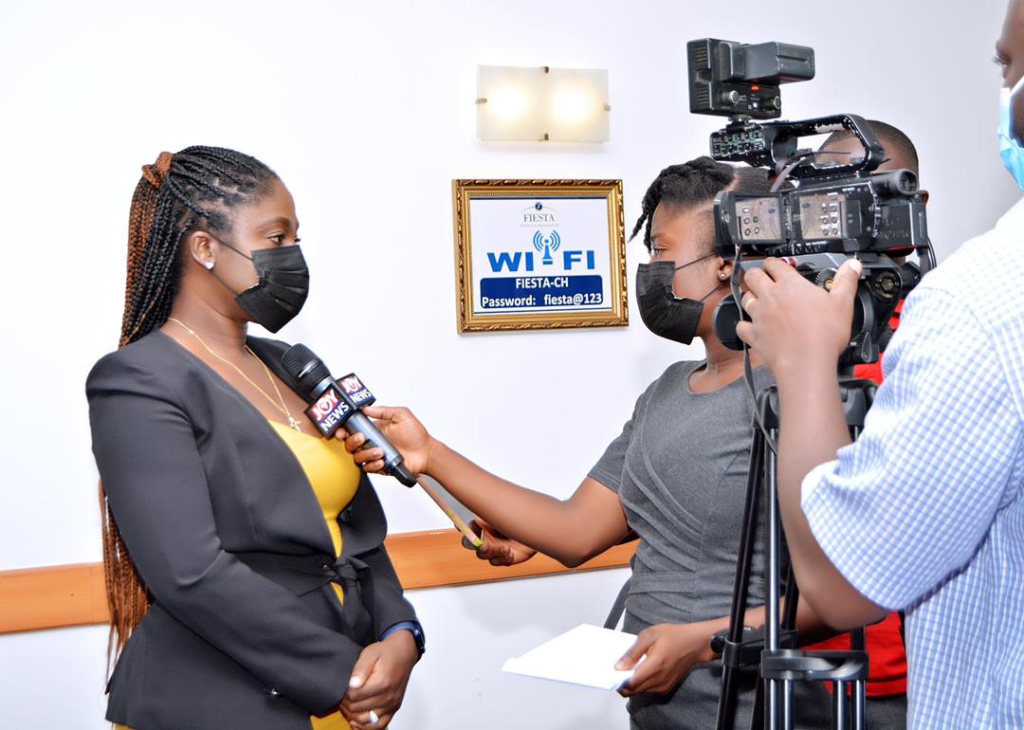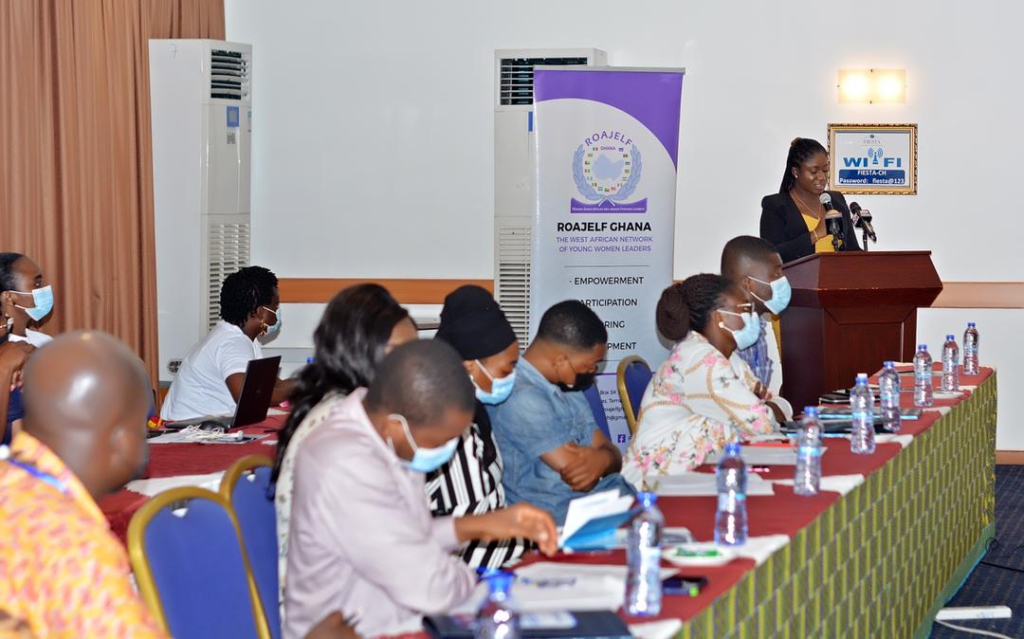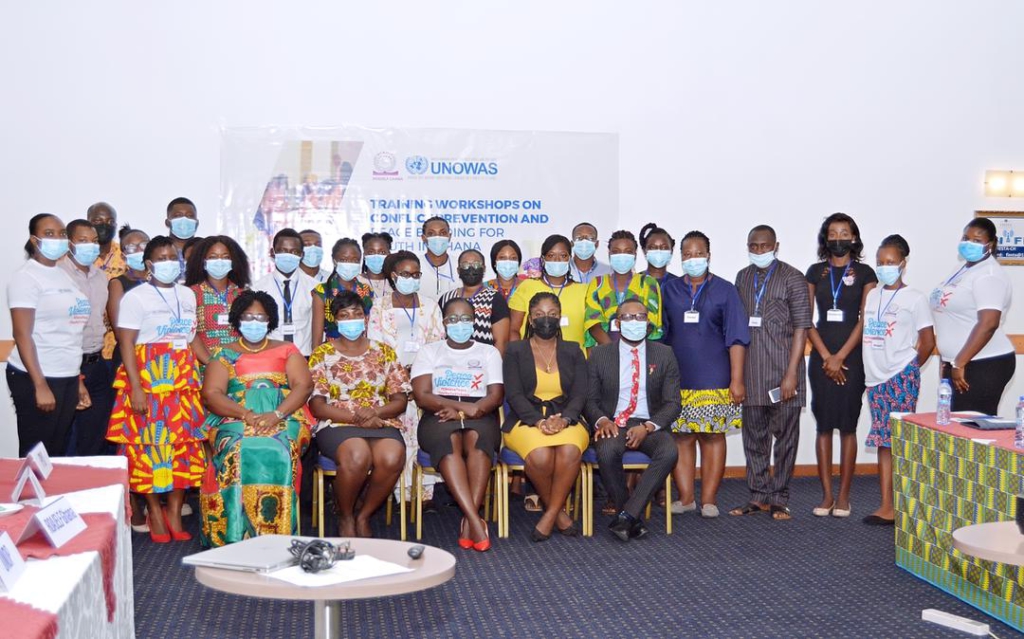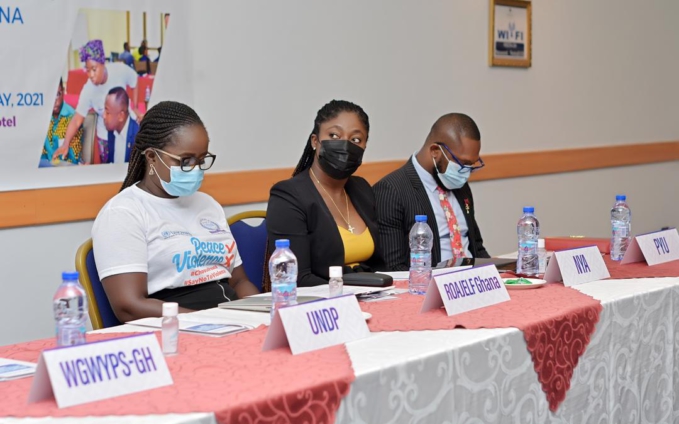Deputy Chief Executive Officer of the National Youth Authority (NYA), Mrs Akosua Manu has reiterated government's commitment to investing significantly in the youth.
"Government has admirably shown clear commitment to young people in this country with initiatives like; the Nation Builders Corp, that has given opportunity to thousands of young people to contribute meaningfully to society, the various entrepreneurship programmes that offer seed capital for brilliant ideas, the investment of millions of dollars into these entrepreneurship projects and support schemes for small scale businesses, the soon to be rolled out Rent Assistance Scheme and the COVID CARES programme all represent government's commitment to investing in our youth" she explained.
Mrs. Manu made these remarks at the opening ceremony of a Conflict Prevention and Peacebuilding training programme for the youth organized by the West African Network of Young Women Leaders, Ghana at the Fiesta Hotel. She spoke on the topic: ‘Mobilizing the youth for peacebuilding in Ghana- The Role of Young People’,
Her comments come as a contribution to the ongoing debate suggesting that the government has become deaf to the plights of Ghanaians.
She noted that the #FixTheCountry campaign has revealed the vibrancy of the young population yearning for more opportunities to participate in nation building.

Mrs Manu therfore stressed government’s commitment to creating life-changing opportunities for the youth while admitting to the difficult realities that confront the nation.

She also disclosed that to promote free expression and encourage young people to participate in constructive discourse, the National Youth Authority has introduced innovative youth parliaments all over the country to create platforms for discourse with hopes to remodel the next generation of leaders.

Mrs Manu further stressed the need to pay attention to the growing radicalization of young people across the world. In the past few years, issues of growing radicalization in West Africa have given Ghana cause for concern. She explained that the government of Ghana is mindful of the deep causes and remains committed to implementing progressive youth centered policies that create jobs and develop the human resource capacity of the young people.
On the recent interfaith debate, the Deputy NYA boss reminded all that: “for Ghana, we have a history of tolerance and cooperation between the major religions” and must therefore avoid taking uncompromising positions when we have disagreements.
Read full text below:
Good morning. I am pleased to join you today to open this three-day training on conflict prevention and peace building for the youth. Even before I move on, I would like to acknowledge the special work being done by the West African Network of Young Female Leaders and other stakeholders in bringing to the youth special trainings such as these. The National Youth Authority under the mandate of the constitution and H.E the President has always supported other organizations pursuing the mandate of unleashing the creative potentials of the youth. That mandate comes with refining the youth and creating an enabling environment for that growth. It is therefore not lost on me the importance of this program and this process to its fulfilment. Kudos to the organizers once again.
When I was given the invitation, I was informed that I am to speak on ‘Mobilizing the youth for peacebuilding in Ghana- The Role of Young People’. Indeed, the events of the past few weeks have shown this is an opportune time to conduct a rigorous assessment of the contribution of our youth towards nation building and the preparedness of the young Ghanaian youth in surviving in the Ghana that is being built. Three issues have hogged the headlines over this period in relation to the youth. These issues while primarily involving the training of the young ones have also touched the national core and the fabric of our society from our media content through to religious tolerance and most recently the fix country campaign.
These matters while unique in their own ways affect the youth and the peace of this country. They all in their own ways present possible national security concerns if not taken seriously and they have come at an opportune time for the institutions responsible for charting national policy and programs for the youth of this country. In this speech, I will briefly address the issues and contextualize them under policy institutions and agents of implementation.
In assessing these stakeholders, I will focus on the two important factors to be addressed when assessing the youth and peace. Every stakeholder should answer two questions:
- Will this radicalize or deradicalize the youth?
- Is this an investment in the youth?
RADICALIZATION
Analysts, sociologists and leaders of global thought have identified radicalization as the biggest threat to peace in the 21st century. It is no accident that all over the world, the rise of populist leadership which comes along with its accompanying twins of religious and ethnic division have risen at this time. It is the kind of leadership that thrives on dividing people rather than collectivizing for progress. This is not new and historically radicalization has been the means of transferring hate from one generation and demographic to the next. In our local context, it must therefore be worrying anytime one issue or the other rears its head in the country. From the decision to deny Tyron Marhguy and the other Rastafarians admission to Achimota on grounds of school rules to the latest impasse in Wesley Girls concerning the observance of the all important moslem ritual of Ramadan, it has led to the resurfacing of conversations surrounding religious tolerance and what it means for us to coexist in a secular state owing fidelity to the constitution and our God. In preservation of our individual religious identity and in furtherance of the mandate to proselytization, what ethos should be considered tolerant?
The conversations in themselves have shown signs of anger among young adherents of all the religions in question . Anger is a popular ingredient for radicalization and that is where institutions have a role to play.
In matters of religious tension, the primary responsibility to maintain the peace falls on religious leaders and institutions. For Ghana, we have a history of tolerance and cooperation between the major religions. This history has served as a springboard for the furtherance of conversations around the cooperation necessary for peaceful coexistence. Hence, public statements targeted at calming nerves and tensions are an important part of the roles of these institutions. In the absence of these calming comments, all other actions and comments that move in the opposite direction will be material for radicalization of borderline line radicals and fundamentalists.
Comments represent an important stage of the solution process but more important are the actions following the comments. Religious institutions must not only be seen to be talking but also act in the interest of undulating compromise. For every issue, a round table discussion of the fundamental causes can always resolve the differences as long as the parties involved can recognize and respect the legitimacy of the other parties to make the arguments they present. Indeed, our society has largely been structured around the major religions and this has seen our educational and corporate practices and accepted standards modeled around what we believe in. As our secular society evolves, it is exigent on us to open up our society to be more understanding of minority religions and their ways of fitting into society. Ours must be a fair society that accommodates all.
Bearing these in mind, our role as the National youth authority, the nerve and policy center of all youth institutions is to create policy and carry out public education campaigns that seek to engage the youth in progressive activity and instills civic duty as a core component of their personhood. It is in this light that we have established youth parliaments all over the country to create platforms for discourse and to remodel the next generation of leaders who would understand the importance of quality communication bundled with empathy, emotional intelligence and gauging the mood of the nation. A platform for this discourse is necessary in providing outlets for the youth to vent their frustrations on key issues such as religious and ethnic tensions. These fora all over the country would become the bedrock of our program to identify hotspots of radicalization and quell them through effective participation and discourse.
A deradicalized youth can only be created by removing echo chambers and creating accessible platforms for progressive conversations.
INVESTING IN THE YOUTH
Radicalization of the youth, as significant as it is, is not the only threat to peace building. If the #FixTheCountry calls that have trended on social media has revealed anything since the campaign started, it is that, we have young people who are clamoring for more opportunities in this country. At the heart of this frustration lies the ugly face of unemployment and disengagement This has the capacity to rob anyone, caught in its grip, off their clarity of purpose. For those fortunate to be employed, there is still a struggle to navigate the high cost of living in our cities and townships. The concerns might have been highlighted on Twitter, but its broader appeal to 1000s of young people in the country is a clarion call.
Far from the on-going debate on whether we should #FixTheCountry or #FixOurSelves, this is a great opportunity to assess our commitment to our young people. What we should not take for granted, are the frustrations the youth have been drawing our attention to in the past week. Government has admirably shown clear commitment to young people in this country with initiatives like: The Nation Builders Corp, that has given opportunity to thousands of young people to contribute meaningfully to society, the various entrepreneurship programs that offers seed capital for brilliant ideas. The investment of millions of dollars into these entrepreneurship projects and support schemes for small scale businesses. The soon to be rolled out rent assistance scheme and the COVID CARES program all represent governments commitment to investing our youth. However, since unemployment and a large human capital investment deficit remain products of years neglect, there is a lot more to be done.
The youth policy which was designed by the national youth authority provides a good framework for investing in the young people of this country and its full implementation will be key. We need to also accelerate programs like, the national youth volunteers’ program by the National Youth Authority, continue the creation of industries to absorb the growing workforce, support the private sector to provide decent jobs and importantly, step up policies to restore the economic growth beyond pre-COVID levels.
We have a duty to create a nation where young people, no matter where they are from, can thrive. Today, we are fortunate that people are just speaking up. If we fail to take this opportunity and invest more meaningfully in the lives of young people, the anger of tomorrow will be more costly.
And this cost my friends will be in living in a tensed atmosphere too hostile for the God of peace. We all have a role to play in deradicalizing the youth and investing in them for the promotion of sustainable peace. We can only mobilize when we connect and empathize.
I would close by saying that peace is not an event. The training should not be limited to the instantaneous transfer of knowledge. To the youth gathered here, I implore you and charge you to go all out and make a difference with all the ideas you will pick up here. Be agents of peace and change, live and breathe the peace and change, and be molded by peace and change.
Latest Stories
-
Joy FM listeners criticise Achiase Commanding Officer’s election comment
3 mins -
Legal Aid Commission employees threaten strike over poor working conditions
6 mins -
Ghana ranked 7th globally as biggest beneficiary of World Bank funding
16 mins -
IMF board to disburse $360m to Ghana in December after third review
20 mins -
Former Bono Regional NPP organiser donates 13 motorbikes to 12 constituencies
26 mins -
Securities industry: Assets under management estimated at GH¢81.7bn in quarter 3, 2024
31 mins -
Gold Fields Ghana Foundation challenges graduates to maximise benefits of community apprenticeship programme
2 hours -
GBC accuses Deputy Information Minister Sylvester Tetteh of demolishing its bungalow illegally
2 hours -
Boost for education as government commissions 80 projects
2 hours -
NAPO commissions library to honour Atta-Mills’ memory
3 hours -
OmniBSIC Bank champions health and wellness with thriving community walk
3 hours -
Kora Wearables unveils Neo: The Ultimate Smartwatch for Ghana’s tech-savvy and health-conscious users
3 hours -
NDC supports Dampare’s ‘no guns at polling stations’ directive
3 hours -
Police officer interdicted after video of assault goes viral
3 hours -
KNUST’s Prof. Reginald Annan named first African recipient of World Cancer Research Fund
3 hours

